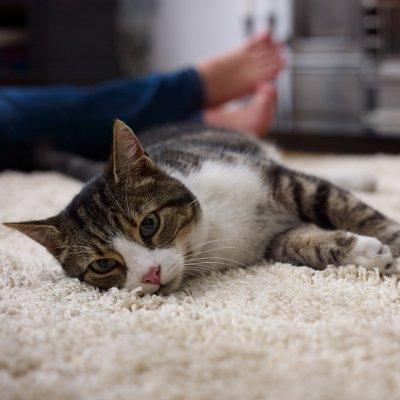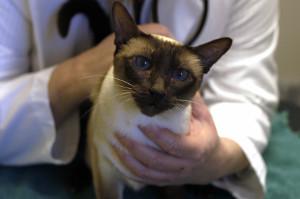
October 29, 2015
PetSafe® Expert
Stacy N. Hackett
The Truth behind Cat Naps
Stretched out in the sun, curled up in the laundry basket, nestled in the quilt at the end of the bed--the family cat seems to find the coziest places to doze and seems to sleep for hours at a time. With his penchant for taking what seems like one long cat nap, you may wonder just how much time your cat spends sleeping.
To Sleep, Perchance to Dream

For the most part, a cat typically sleeps anywhere from 15 to 20 hours per day, alternating between short, 5-minute periods of deep sleep and 15-30 minute stretches of dozing. While dozing, a cat hovers just under awareness, which is why it seems that your cat will open his eyes as soon as you walk in the room.
Not all cats need the same amount of sleep, just as all humans vary in their need for sleep. The amount of sleep your cat needs also depends on her age, with young kittens and senior cats sleeping more than juvenile or adult cats. A newborn kitten may sleep almost 24 hours a day, waking only to nurse for short periods, then going right back to sleep. A senior cat, on the other end of the spectrum, may sleep for longer periods of time as a normal part of the aging process.

And though your cat spends a lot of his day sleeping, you probably notice that he's awake and waiting for you when you get home from work or crazily racing around the house first thing every morning. Contrary to common belief, cats aren't nocturnal. These bursts of energy and alertness every morning or evening are related to the cat's "crepuscular" nature, meaning that a cat is more active at dawn and dusk. This activity pattern, in turn, is linked to the behavior of a cat's natural prey--small rodents and birds--which are most active at sunrise and sunset.
Too Much of a Good Thing?

With the norm for feline sleep hovering between 15 and 20 hours per day, you may wonder if there is such a thing as too much sleep for your cat. Veterinarians recommend that you have a rough idea of what is normal for your particular furry friend so you can notice any changes in his regular sleeping pattern. Too much sleep may indicate that your cat is sick, with illnesses such as diabetes, kidney or liver problems, or infections causing most cats to sleep more.
Other conditions may cause your cat to be restless, especially at night. Cognitive dysfunction--which is the feline equivalent of Alzheimer's disease--can cause a cat to become disoriented and wander the house calling out to his family. Disruptions in the household routine can also result in a cat becoming more active in the middle of the night. If your cat suddenly changes his sleeping behavior, take him to your vet as soon as possible for a thorough exam.
Sweet Slumber
Next time you see your cat stretched out or curled up, set aside your thoughts about how much he sleeps. Instead, join him for a shared cat nap. You may find yourself joining him more often!
Get Email Updates
Subscribe to the latest news, promotions, & more from PetSafe® brand.
Sign up today for the latest news, promotions, and more from PetSafe® brand.



